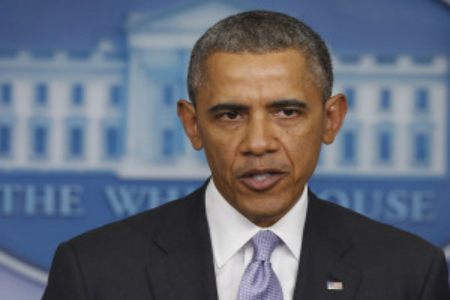
The Obama administration took steps Wednesday to support the defenses of U.S. allies in Europe in response to Russia’s takeover of Ukraine’s Crimean Peninsula.
Testifying before the Senate Armed Services Committee, Defense Secretary Chuck Hagel said the U.S. was stepping up joint aviation training with Polish forces. The Pentagon also is increasing American participation in NATO’s air policing mission in its Baltic countries, he said.
In his remarks, Hagel focused on U.S. diplomatic and aid efforts since Moscow’s incursion into Ukrainian territory. He said he’d speak later Wednesday with Ukraine’s new defense minister; Joint Chiefs Chairman Gen. Martin Dempsey spoke to his Russian counterpart earlier in the day. Neither Hagel nor Dempsey mentioned military options.
“I urge continued restraint in the days ahead in order to preserve room for a diplomatic solution,” Dempsey told the Senate panel.
While the hearing was supposed to focus on the military’s budget, both witnesses quickly addressed the ongoing events in Ukraine.
Since last weekend, Russian troops have taken control of much of the peninsula in the Black Sea, where Russian speakers are in the majority. Moscow doesn’t recognize the Ukrainian leadership that came to power after protesters ousted the country’s pro-Russian president last month. President Vladimir Putin and other officials have cited strategic interests as well as the protection of ethnic Russians in making the case for intervention.
Hagel said the U.S. was reaffirming its commitment to allies in Central and Eastern Europe, some of whom spent decades in the last century under Soviet domination. European countries are grappling with their own response to the crisis, fearful about moves reminiscent of Russia’s Cold War policy of regional hegemony but equally concerned about damaging trade and energy partnerships vital to their economies.
Democratic and Republican senators are crafting a bill that would impose sanctions on Russian government officials and export industries such as petrochemicals, but want to coordinate action with European governments.
“Really this comes down to whether Europe is willing to join us,” said Sen. Chris Murphy, D-Conn., who heads a Senate subcommittee focused on the region. “Europe is not where they need to be right now. I think they are willing to give Putin a much longer leash than we are.”
Also Wednesday, the top members of the House Foreign Affairs Committee introduced a resolution condemning Russia’s actions in Ukraine and calling on the Obama administration to impose “visa, financial, trade and other sanctions” on Russian officials, state-owned banks and companies. The resolution will be addressed by the committee Thursday.
Meanwhile, a separate House bill circulated Wednesday to pay for loan guarantees to be extended to Ukraine.
The additional U.S. military support to Europe is limited in scope so far.
The aviation detachment mission in Poland is designed to enable the country to host multiple allied Air Force elements and serve as a regional hub for air training and multinational exercises. The U.S. and Poland are discussing further activities for the detachment, military officials said.
And in the Baltics, the U.S. plans to deploy six additional F-15 fighter jets and a military refueling and a KC-135 military refueling aircraft. The planes will fly from Britain to Lithuania this week, officials said.
Regarding Ukraine specifically, Sen. Lindsey Graham, R-S.C., asked if the Pentagon would provide the country with arms support in the hypothetical event of a larger Russian invasion.
Such a decision would be for President Barack Obama to make, Hagel responded. He said efforts now center on ensuring Russian troops return to their barracks in the Crimean port city of Sevastopol, where Russia’s Black Sea Fleet has a lease until 2042, and allowing Ukraine’s new government to prepare for elections in two months’ time.
“This needs to be de-escalated, where the tensions are down, the troops go back to their base, the new government is allowed to govern,” Hagel said.